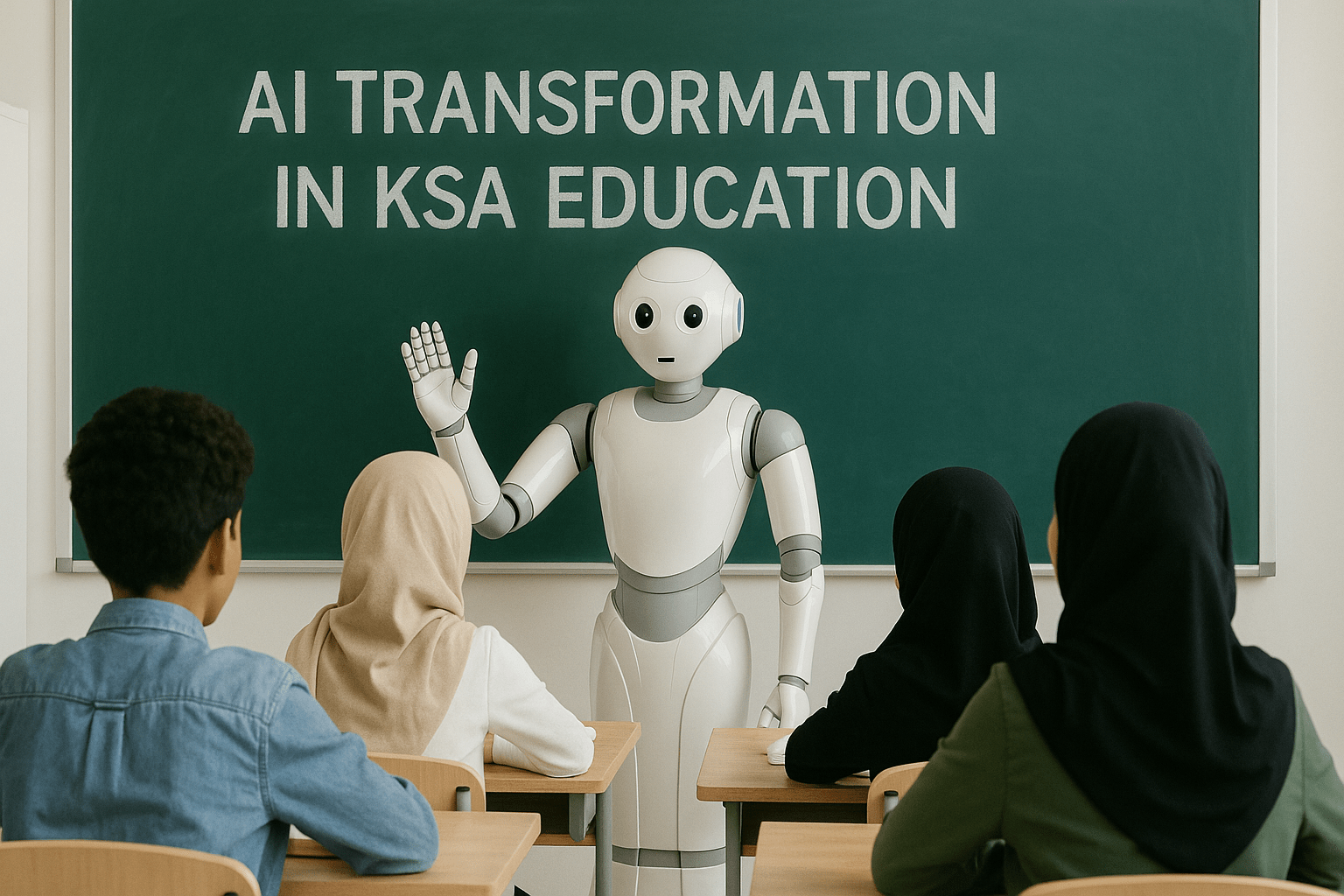AI in Education: Transforming Saudi Classrooms with NLP
Introduction: Vision 2030 and the Educational Renaissance
AI in education is no longer a futuristic concept; it’s a present-day reality transforming the way students learn and teachers teach. In Saudi Arabia, AI technologies like Natural Language Processing (NLP) are playing a critical role in creating smarter, more inclusive classrooms aligned with the country’s Vision 2030 goals. Saudi Arabia’s Vision 2030 has set a bold agenda for transforming every sector of society, and education lies at the heart of this transformation. With a young population, rapidly expanding technological infrastructure, and a commitment to diversifying the economy, the Kingdom recognizes that a robust, future-facing education system is essential for sustained national progress. Artificial Intelligence (AI)—especially in the form of Natural Language Processing (NLP)—is becoming a game-changer in reimagining how learning happens in Saudi classrooms.
Natural Language Processing, a branch of AI focused on the interaction between computers and human language, enables machines to read, interpret, and respond to human text and speech. In the classroom context, this means everything from real-time speech translation to intelligent feedback on student essays, from adaptive learning platforms to AI-driven sentiment analysis of student engagement.
This article explores how AI, driven by NLP, is revolutionizing Saudi education, improving access, enhancing personalization, empowering teachers, and developing digitally fluent students who can thrive in a globalized, AI-powered world.
The Power of NLP in Education
NLP enables AI systems to understand and generate human language. In education, it facilitates a range of powerful applications:
- Automated essay scoring
- Speech-to-text transcription
- Real-time translation
- Chatbots for homework assistance
- Reading comprehension tools
- Sentiment and emotion analysis
These tools, when localized to the Saudi context, can address the unique linguistic, cultural, and curricular needs of the Kingdom’s schools.
Personalized Learning for Every Student
Saudi Arabia’s classrooms are often diverse, with students possessing varying learning speeds, comprehension levels, and language proficiencies. NLP-powered AI systems adapt content delivery to individual student needs. Platforms like Sabaq, Noon Academy, and newly emerging AI-based tools now offer:
- Individualized reading levels based on real-time vocabulary assessment
- Adaptive quizzes that adjust difficulty based on previous answers
- Feedback loops where students receive grammar and comprehension guidance instantly
This level of personalization fosters deeper engagement and retention, helping Saudi students develop stronger academic foundations in both Arabic and English.
Breaking the Language Barrier
With Arabic as the national language and English a global necessity, Saudi education faces the challenge of dual-language fluency. NLP is uniquely positioned to bridge this gap:
- Real-time translation tools support students with limited English proficiency
- Arabic NLP models help non-native speakers engage with curriculum content
- Voice recognition tools assess pronunciation and fluency
Startups and innovators within the Kingdom are increasingly working on Arabic-specific NLP tools that understand dialectical nuances and local context—features often missing in global platforms.
Supporting Teachers with AI
Teachers in Saudi Arabia are central to Vision 2030’s education transformation. AI does not replace them but augments their abilities. NLP-enabled tools provide:
- Automated grading of short answers and essays
- Speech-to-text note-taking for teacher lectures
- Analytics dashboards that visualize class engagement trends
- Early warning systems that detect student disengagement or emotional stress
By reducing administrative burdens and enabling real-time insights, AI allows educators to focus on deeper instruction and mentorship.
Smart Classrooms: Pilot Projects and Government Support
The Saudi Ministry of Education is investing in smart classroom infrastructure, especially in newly developed cities like NEOM. Some of the pilot projects include:
- Interactive whiteboards with voice-command NLP
- AI tutors integrated into learning management systems
- Intelligent classroom assistants that can answer student queries using NLP
- Data-rich teacher portals for tailoring lesson plans based on AI insights
These smart classrooms are helping bridge the digital divide and make learning more interactive and effective.
Assessment and Feedback Reinvented
Standardized testing and manual grading have long dominated Saudi classrooms. NLP offers alternatives:
- AI essay scoring tools provide immediate, objective, and constructive feedback
- Speech assessment tools analyze oral exams and pronunciation
- Student writing assistants improve grammar, coherence, and clarity
This shift is especially beneficial for students in rural areas, where access to consistent feedback has historically been a challenge.
Addressing Inclusivity and Special Needs
AI can be a powerful equalizer in education. NLP tools enable:
- Text-to-speech systems for visually impaired students
- Speech recognition tools for students with motor impairments
- Language simplification tools for students with learning disabilities
These capabilities align with the Kingdom’s goals for inclusive, barrier-free education for all its citizens.
Data, Privacy, and Ethical Use
With the adoption of AI in classrooms comes the responsibility to manage data securely. The Saudi Data and Artificial Intelligence Authority (SDAIA) and the Ministry of Education have issued guidelines to ensure:
- Student data privacy
- Transparency in AI decision-making
- Bias-free language processing
Companies and platforms deploying NLP in Saudi classrooms must comply with these frameworks to build trust and ethical AI ecosystems.
Local Innovation: The Role of Semantic Brains
Semantic Brains, a Saudi company specializing in custom AI models, is at the forefront of deploying NLP in education. Its models are:
- Trained on Arabic language corpora
- Capable of understanding local dialects
- Integrated into both government and private educational platforms
Their work not only strengthens classroom experiences but also helps train Saudi AI talent through internships and partnerships with local universities.
Building Digital Fluency for Vision 2030
Vision 2030 requires a workforce that is creative, tech-savvy, and globally competitive. AI in education—especially through NLP—builds these competencies:
- Critical thinking through AI-enhanced problem-solving tasks
- Language fluency through intelligent practice tools
- Digital citizenship by understanding and working with AI platforms
This educational foundation directly supports the broader economic and technological goals of the Vision.
Future Outlook: What’s Next?
Over the next decade, Saudi Arabia is poised to:
- Expand NLP integration across all public schools
- Develop national AI curriculum standards
- Invest in homegrown EdTech startups
- Launch AI literacy programs for teachers and administrators
As NLP models become more sophisticated, we can expect voice-based learning, AI-driven peer collaboration tools, and even AI-moderated group discussions in classrooms.
Conclusion: A New Era of Learning
AI in education is not just a trend—it’s a transformation. In Saudi Arabia, NLP-powered tools are revolutionizing how students learn, how teachers teach, and how institutions operate. This isn’t merely technological progress; it’s a human-centered evolution that respects local culture while embracing global best practices.
Through the thoughtful integration of NLP into its classrooms, Saudi Arabia is preparing its youth not just for jobs of tomorrow but for leadership in the digital economy. Education in the Kingdom is no longer bound by walls or textbooks—it’s powered by data, enriched by AI, and open to every learner.
And at the center of this revolution is language, understood, analyzed, and amplified by NLP.
Click HERE
AI Transformation in KSA Education: NLP in the Classroom


